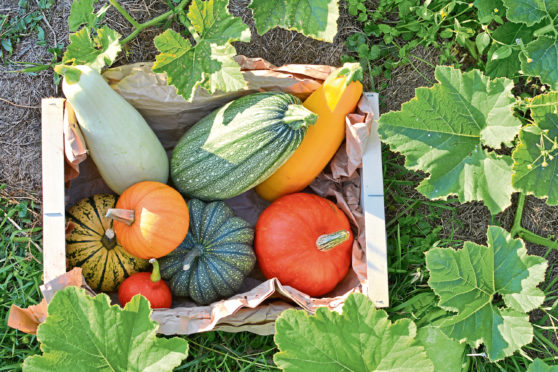
While it might be tempting to grow a few giant pumpkins and take your chances at the annual world championships, where growers exhibit fruits the size of family cars, a much better use of the vegetable patch is to grow squash that you can actually eat.
There is a huge diversity of squash, including both summer and autumn varieties, and the small ones in particular, with striped skins and scalloped edges, are as pretty as they are delicious. If you raised some squash plants from seed this year and planted them out in late spring then these may already be threatening to overtake the plot with their large and vigorous leaves.
Squashes are hungry beasts and some gardeners resort to growing them directly on the compost heap, a trick that provides both heat and nutrients for the plants. Otherwise it’s best to dig a hole, fill this with well-rotted manure then mound up the soil and plant them into this.
It is a good idea to limit pumpkins to two fruits per plant, but summer squashes, which are in fact non-standard shaped marrows, are best picked when small and sweet so these will continue to produce new fruits all summer.
On all plants, feed fortnightly once the fruits start to swell. Competitive growers guard the secret of their plant food recipes and cannot be induced to reveal what goes into the liquid that they give to their prize pumpkins. For those gardeners who are aiming to produce edible pumpkins or to carve a few Halloween lanterns, then normal tomato fertiliser will do.
As pumpkins grow bigger, lay straw beneath the fruits to keep these off the earth where they could otherwise rot. You’ll know they are ripe when they have taken on good colour and at this point sever them from the plant with 5cm of stalk still attached and leave them somewhere sunny and dry in order to cure the skin.
Pumpkins will store for several months if kept in a cool, dry place and the taste of roast pumpkin, sprinkled with rosemary, is a classic taste of autumn.
Elsewhere on the plot check strawberry plants every day and pick fruit as it ripens – and make sure that nets over soft fruit are kept taut to prevent them from being a hazard to birds.

Enjoy the convenience of having The Sunday Post delivered as a digital ePaper straight to your smartphone, tablet or computer.
Subscribe for only £5.49 a month and enjoy all the benefits of the printed paper as a digital replica.
Subscribe